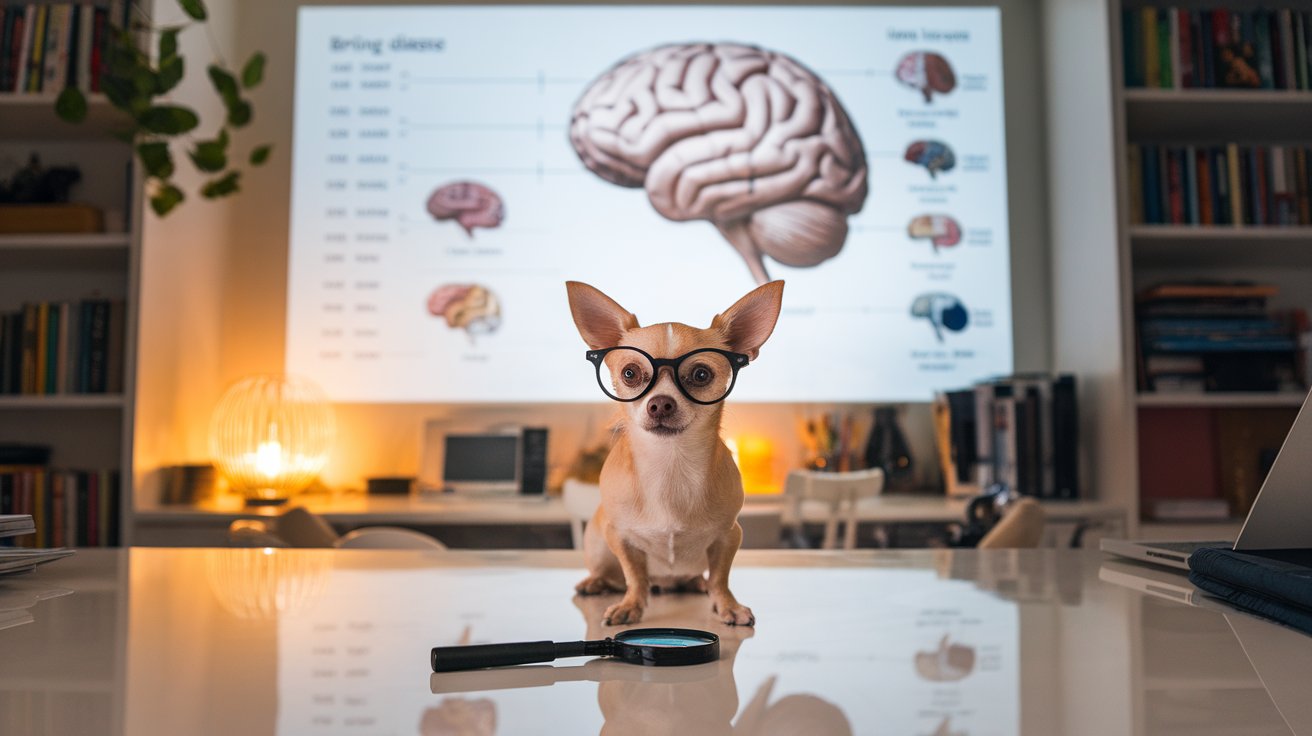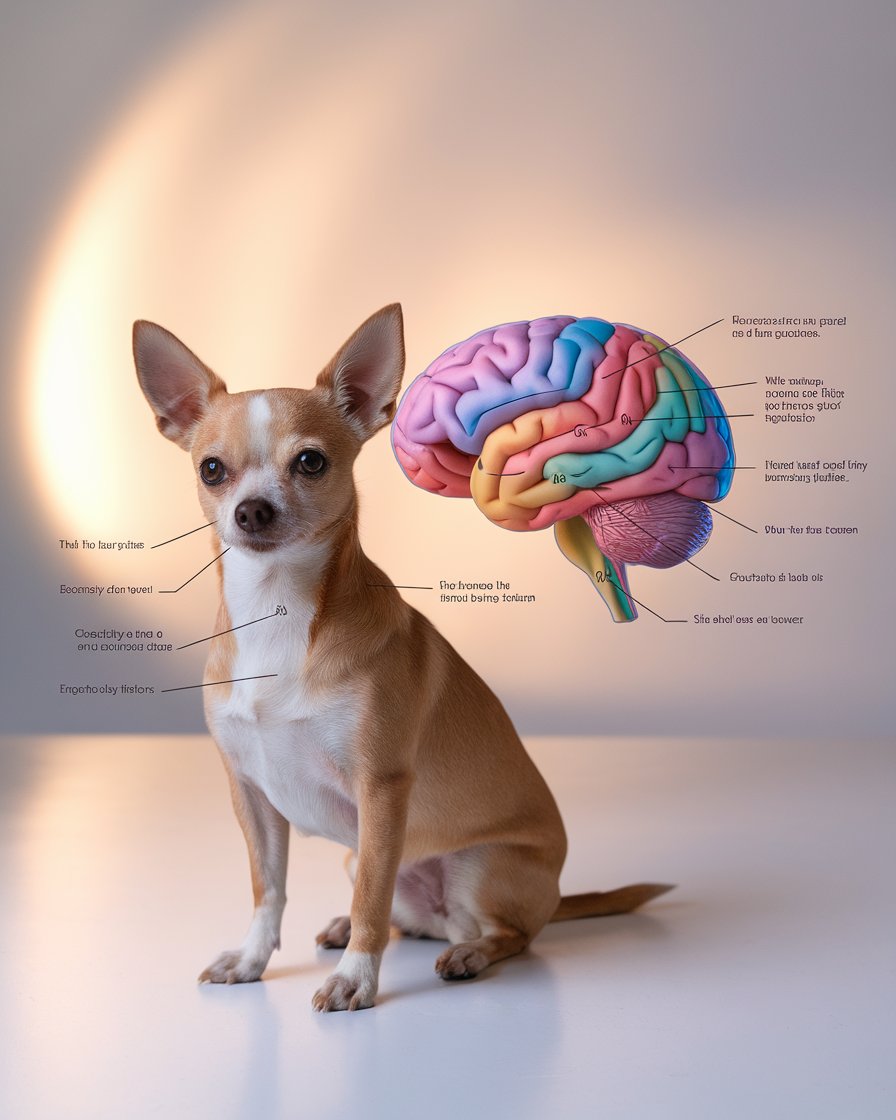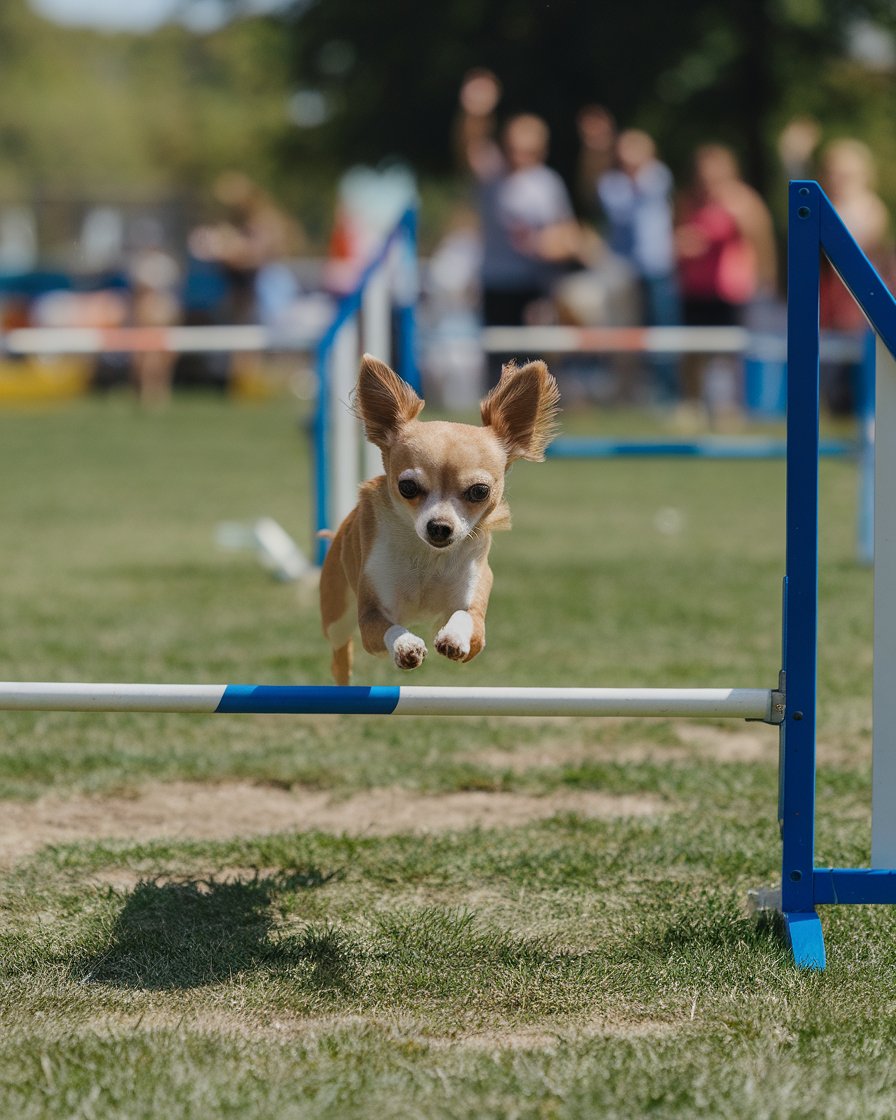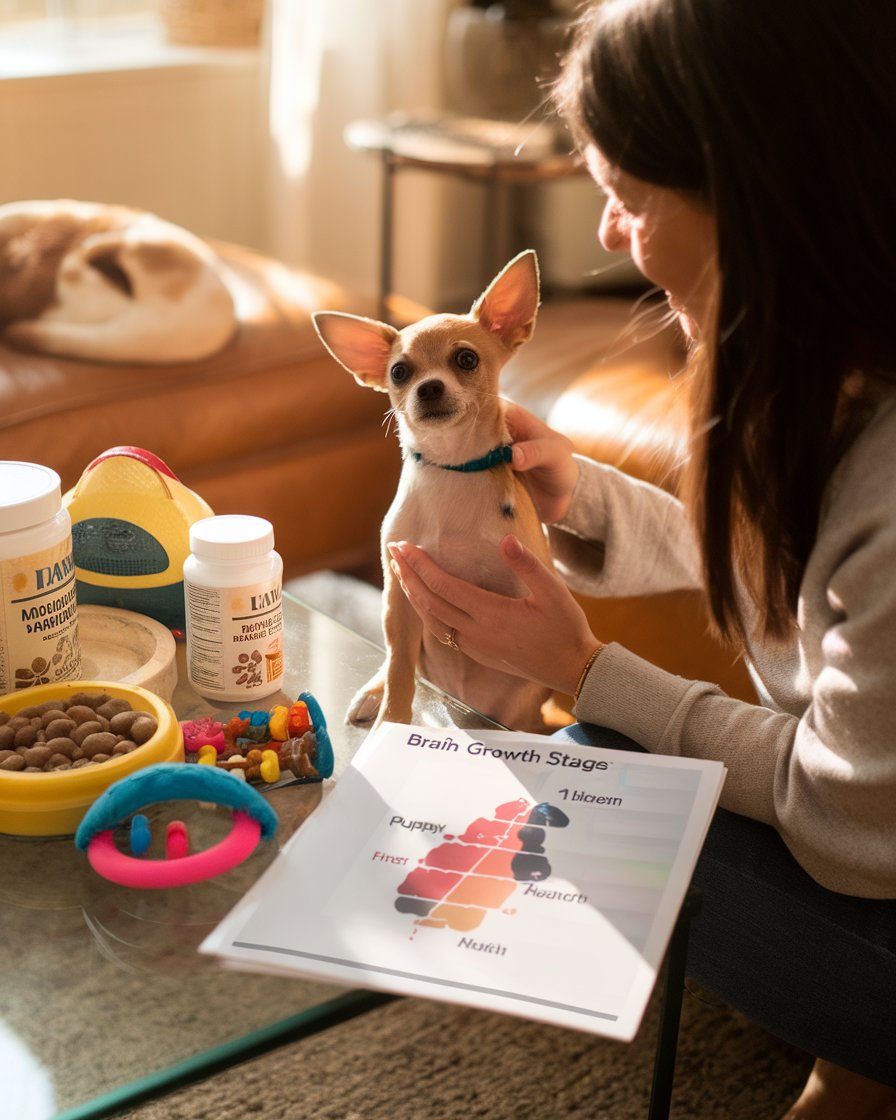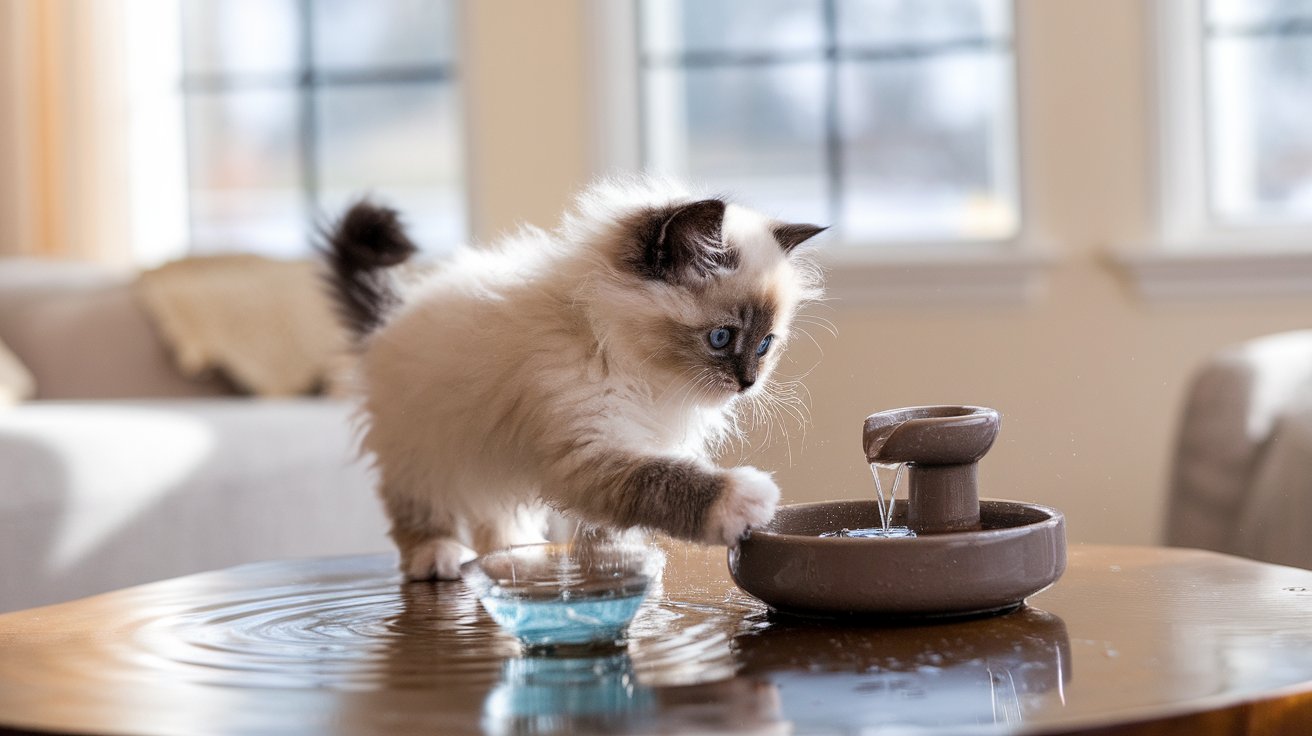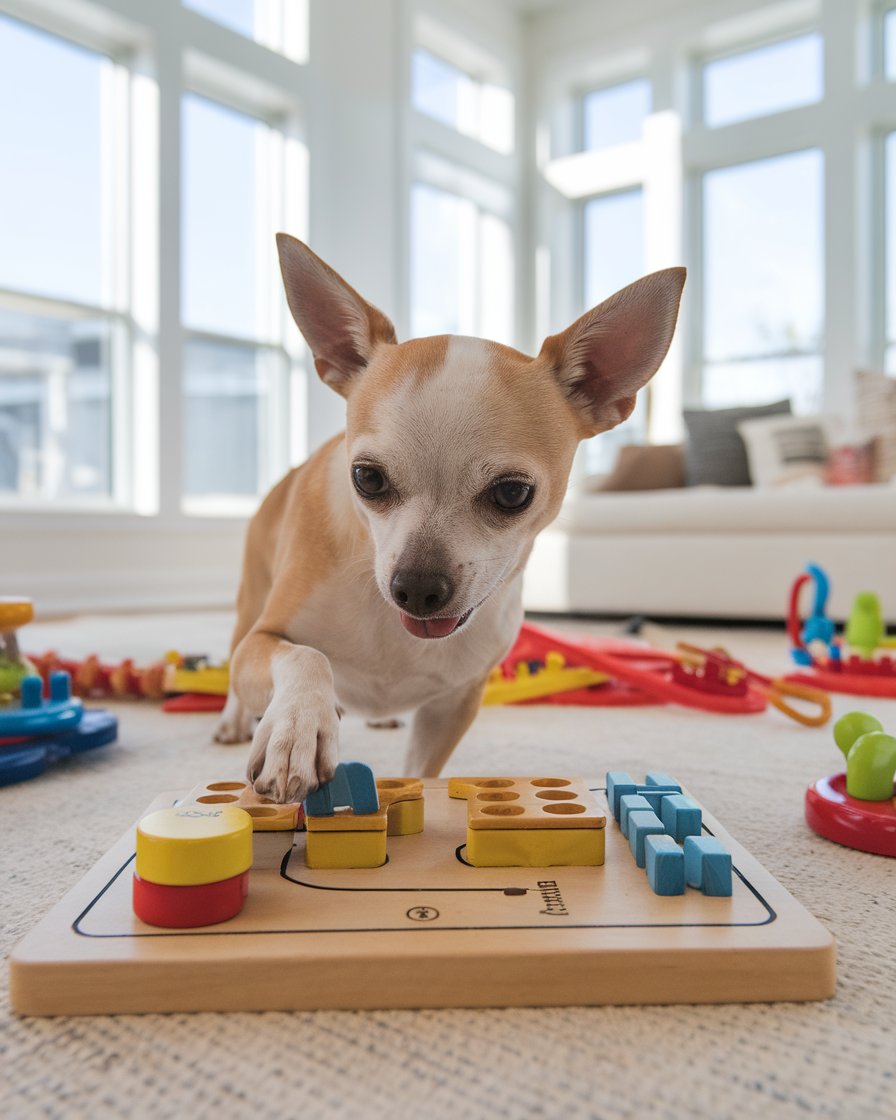Introduction
Chihuahuas, despite their small size, are known for having one of the largest brain-to-body size ratios among all dog breeds. Their brains, which weigh around 55.10 grams on average, are proportionately big for their skulls, enabling them to display impressive cognitive abilities. While the brain of a Chihuahua may only be the size of an orange, it plays a vital role in their sharp reflexes and problem-solving skills. These dogs are not only quick learners but are also known for their remarkable memories, which allow them to remember commands and routines with ease.
However, Chihuahua brain size is influenced by both genetics and environmental factors. Breeding practices aimed at making them smaller, such as the development of the teacup Chihuahua, can impact brain development. Additionally, proper care, including nutrition and mental stimulation, is essential in ensuring their cognitive growth. Chihuahua owners should be aware of common brain problems, such as hydrocephalus, and provide enriched environments to support their mental health.
Key Takeaways
Chihuahuas have one of the largest brain-to-body size ratios among dog breeds, allowing them to exhibit sharp reflexes and impressive cognitive abilities despite their small size.
Genetics and selective breeding influence Chihuahua brain size, with traits like compactness sometimes affecting brain development, particularly in teacup varieties.
Environmental factors such as nutrition and mental stimulation are critical for healthy brain growth, helping Chihuahuas develop better problem-solving skills and cognitive abilities.
Chihuahuas benefit from regular training and socialization, which enhance their cognitive function and foster stronger emotional bonds with their owners.
Engaging activities like puzzle toys and interactive games keep Chihuahuas mentally sharp, preventing boredom and promoting overall well-being.
Common brain problems, such as hydrocephalus, can affect Chihuahuas, emphasizing the importance of proper care and veterinary attention for their mental health.
The Anatomy of a Chihuahua’s Brain
Chihuahuas, known for their lively and bold personalities, have a unique brain structure that intrigues both scientists and dog lovers. Despite their small size, the size of a Chihuahua brain is quite developed and plays a crucial role in their behavior. Chihuahuas have the largest brain proportional to their body, giving them a high brain-to-body size ratio. This characteristic enables big is a Chihuahua brain to exhibit sharp reflexes and intelligence far beyond their small stature. The brain’s structure is big for its skull and is responsible for their affectionate and loyal nature, as it governs emotions and social interactions. The brain the size of a tangerine allows for impressive mental capabilities, making them ideal companions for dog owners. Understanding the area of the brain in a Chihuahua sheds light on their cognitive abilities. Even the average Chihuahua has remarkable mental acuity compared to smaller dogs.
How Big is a Chihuahua Brain: Key Insights
Proportional Brain Size Chihuahuas have one of the largest brain-to-body size ratios among dog breeds. This unique feature enables them to exhibit high levels of intelligence and sharp reflexes, despite their small stature. Their brain is large in proportion to their tiny bodies, giving them remarkable cognitive abilities.
Chihuahua Brain Weight On average, a Chihuahua’s brain weighs about 55.10 grams. This small but powerful brain manages various essential cognitive and physical functions. The mean brain weight of Chihuahuas is higher relative to their body size than many larger dog breeds, contributing to their quick thinking and adaptability.
Comparison to Other Breeds While the brain size of a Chihuahua may seem small compared to larger dogs like Great Danes, its efficiency is undeniable. Their brain structure supports their agility and intelligence, proving that brain mass isn’t the sole factor in cognitive function. Chihuahuas smart dogs can outthink many larger breeds despite their smaller size.
Brain Structure and Functionality The structure of a Chihuahua’s brain allows it to process emotions, problem-solving, and quick reactions. Their body weight to its brain size supports their agility, making them one of the most mentally alert toy breeds. Understanding how their brain is big and their skull functions helps explain why Chihuahuas excel in problem-solving.
Impact of Brain Size on Behavior The relatively large size of a Chihuahua’s brain plays a key role in their behavior. It governs their social interactions, affectionate nature, and emotional responses, making them loyal companions. Owners can better understand their pet’s temperament and mental capabilities by considering the correlation of brain weight to behavior.
Exploring the Size and Structure of a Chihuahua’s Brain
Chihuahuas may be small, but their brain is relatively large for their skull size, especially compared to other dog breeds or toy dog. Their body weight to its brain size is one of the highest among canines, allowing them to display impressive problem-solving abilities. This small but powerful brain contributes to their agility and quick thinking. The mean brain weight of Chihuahuas is around 55.10 grams on average and is about the size of a tangerine. Despite its size, the Chihuahua’s brain manages essential cognitive and physical functions, enabling these tiny dogs to thrive. Chihuahuas smart dogs with big and their skull size can exhibit mental capabilities often underestimated due to their size. The correlation of brain weight to their body is what allows them to function efficiently in a variety of environments.
Comparing Chihuahua Brain Size to Other Dog Breeds
While the Chihuahua’s brain may seem small next to larger breeds like Labradors or Great Danes, it punches above its weight in terms of efficiency. Their brain size is large in relation to their tiny bodies, a feature that gives them sharp reflexes and adaptability. The Chihuahua’s brain is compact yet wired with the necessary neural pathways to handle their playful yet intelligent nature. When compared to the larger breeds, Chihuahuas have the largest brain-to-body size ratio, proving that intelligence and mental agility don’t solely depend on brain mass.
Chihuahua Brain Effectiveness
Chihuahuas, despite their small stature, are equipped with surprisingly effective brains. Their size brain and brain-to-body size ratio are among the largest of all dog breeds, allowing them to exhibit sharp reflexes and intelligent behavior. This is evident in their ability to respond quickly to commands and their impressive capacity for forming emotional bonds with their owners. Including Chihuahuas, they are known for their alertness and problem-solving abilities, traits that contribute to their reputation as quick learners. With a mean brain weight of about 55.10 grams, their brain might be small compared to a human’s, but its efficiency is undeniable. Understanding this effectiveness, along with their brain weight and yawn duration, helps owners appreciate the unique mental capabilities of the breed. Even as puppies, Chihuahuas show remarkable intelligence and adaptability despite being only 6 to 9 inches tall.
Case Study: Chihuahua Brain Effectiveness in Cognitive Development
A study conducted by the University of Veterinary Medicine in Vienna highlighted the cognitive prowess of small dog breeds, particularly Chihuahuas. The research aimed to understand the relationship between brain size and problem-solving abilities. Chihuahuas, despite their small size and weight of approximately 55.10 grams, exhibited remarkable problem-solving skills, especially in memory-based tasks. The study found that Chihuahuas excelled in agility-based exercises and learning new commands quickly, outperforming several larger breeds with bigger brains.
The key factor that allowed Chihuahuas to excel in these tasks was their brain-to-body size ratio, which is one of the highest among all dog breeds. This ratio contributes significantly to their alertness, quick reflexes, and ability to bond with their owners emotionally. The study concluded that the Chihuahua’s compact brain, though smaller in size compared to other breeds, was highly efficient in processing complex tasks, making them ideal companions for those seeking intelligent and responsive pets.
Unraveling the Cognitive Abilities of Chihuahuas
Chihuahuas are remarkable for their cognitive abilities, which often surprise people given their small size. Their brain’s size and structure enable them to excel in learning and problem-solving. These dogs are particularly good at adapting to their environment, often using their mental skills to manipulate situations to their advantage. For example, they quickly figure out how to get attention or how to use their charm to avoid discipline. Chihuahuas also have a good memory, allowing them to remember commands and routines with minimal reinforcement. Their sharpness and intelligence make them easy to train, even if they sometimes exhibit a stubborn streak.
Examining Chihuahua Brain Development
The development of a Chihuahua’s brain begins early and plays a vital role in their future behavior. Proper socialization and exposure to a variety of environments during their early stages are crucial for optimal brain development. Stimulating activities, such as interactive play and problem-solving games, help to foster their mental growth. As Chihuahuas age, their brain continues to adapt and learn, although they might become more set in their ways over time. For a Chihuahua to reach its full cognitive potential, consistent mental challenges and positive reinforcement are essential. This development process ensures that Chihuahuas maintain their intelligence and agility throughout their lives.
Factors Influencing Chihuahua Brain Size
The size of a Chihuahua’s brain is influenced by both genetic and environmental factors. Despite their small stature, Chihuahuas are also known for having relatively large brains compared to their body size, which gives them an impressive brain-to-body size ratio. This allows them to showcase remarkable cognitive abilities, similar to those of larger breeds. While their biggest brain relative to size contributes significantly to their intelligence, other elements like lineage, nutrition, and mental stimulation are equally crucial in shaping their development. The potential for brain damage is something owners should be aware of, especially in cases of injury or neglect. By understanding these factors, dog owners can support their Chihuahua’s cognitive growth, allowing them to develop into responsive and intelligent companions. Just like the human brain, proper care ensures long-term mental health and well-being.
Genetic Influences on Chihuahua Brain Size
The genetics of Chihuahuas play a significant role in determining brain size and function. Selective breeding practices aimed at enhancing specific traits, such as their compact size, can also impact the development of their brains. Teacup Chihuahuas, for instance, are bred to be smaller, and this might influence the size of their brains, which must still fit within their tiny skulls. Additionally, Chihuahuas are known to have a larger brain-to-body ratio than many other dog breeds, which is inherited from their lineage. Dogs bred from healthy, well-cared-for lineages tend to display more consistent brain development, which contributes to their cognitive performance and behavioral traits.
Environmental Factors and Their Impact on Chihuahua Brain Growth
Environmental factors significantly impact Chihuahua brain development, shaping not only its size but also its functionality. Proper nutrition during a puppy’s early life is essential, as it supports healthy brain growth. In addition to diet, mental stimulation through play, training, and interaction is equally vital. Chihuahuas raised in enriched environments with plenty of social interaction tend to develop better cognitive skills and exhibit quicker problem-solving abilities. Conversely, a lack of stimulation and poor nutrition can lead to stunted brain growth, affecting their ability to learn and adapt. Thus, creating a nurturing environment that fosters both physical and mental growth is crucial for a Chihuahua’s brain development.
“Size matters not. Look at me. Judge me by my size, do you? And well you should not.” – Yoda, The Empire Strikes Back
Training and Stimulating a Chihuahua’s Brain
Chihuahuas, despite their small size, possess sharp and agile minds that benefit greatly from training and mental stimulation. Regular mental exercises are just as important as physical activity to maintain their cognitive health. Engaging in stimulating tasks can improve chihuahua brain weigh, boost cognitive function, and reduce common chihuahua brain problems. Incorporating activities like puzzles and interactive games strengthens their learning abilities and enhances their bond with owners. By paying attention to their brain to body size and ensuring consistent mental challenges, you can ensure their brain stays active and sharp. These activities, tailored to their needs, promote a happier, healthier life for your deer head chihuahua. Preventing brain tumor and other brain problems that Chihuahuas can encounter is vital, and this proactive care ensures longevity and well-being for your beloved companion.
Effective Training Techniques for Enhancing Chihuahua Brain Function
Training a Chihuahua to sharpen its brain function requires consistency and patience. Positive reinforcement, such as offering treats, toys, or verbal praise, works particularly well with this breed. Chihuahuas respond best to training that is rewarding and fun. Start with simple commands like “sit,” “stay,” and “come,” then gradually move into more complex tasks like fetch or learning specific tricks. Socialization is equally important; it helps expose them to different environments and other dogs, which stimulates brain activity. Keeping training sessions short but frequent is key, as Chihuahuas tend to lose focus quickly. These techniques will not only enhance brain function but also improve their overall behavior.
Engaging Activities to Stimulate a Chihuahua’s Brain
Keeping a Chihuahua mentally engaged through interactive activities is essential for their cognitive development. Puzzle toys and brain games, which challenge them to solve problems to receive treats, are excellent tools for mental stimulation. Scent work, where they use their sense of smell to locate hidden objects, can also be highly rewarding for Chihuahuas. Additionally, regular exposure to new environments, such as parks or different walking routes, provides mental stimulation and helps them adapt to unfamiliar stimuli. Incorporating these activities into your Chihuahua’s daily routine will not only keep their brain sharp but also contribute to their emotional well-being, preventing boredom-related issues.
Conclusion
In conclusion, Chihuahuas may be small in stature, but their brain size and cognitive abilities are impressive for their body size. With a brain-to-body size ratio among the highest in dog breeds, these dogs exhibit sharp reflexes and mental agility, making them quick learners. However, their brain development is influenced by both genetics and environmental factors, including nutrition and mental stimulation. Owners should prioritize enriching their Chihuahua’s environment to foster their mental growth.
Despite having relatively large brains, Chihuahuas are prone to brain problems, such as hydrocephalus, making proper care and regular checkups crucial for their well-being. Whether a teacup Chihuahua or a standard breed, maintaining a stimulating environment and encouraging social interaction are essential for optimal brain function. Through proper care, training, and attention to their mental needs, Chihuahuas can live happy, intelligent, and responsive lives, despite their small size.

